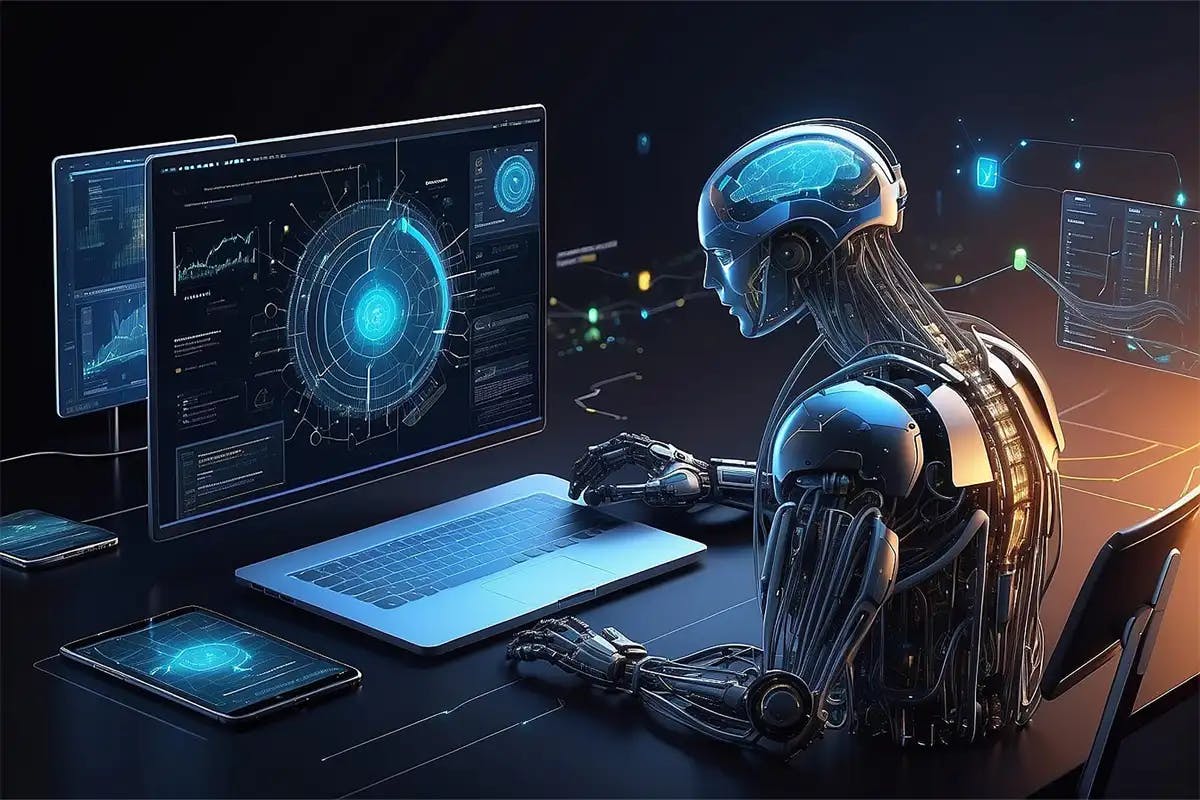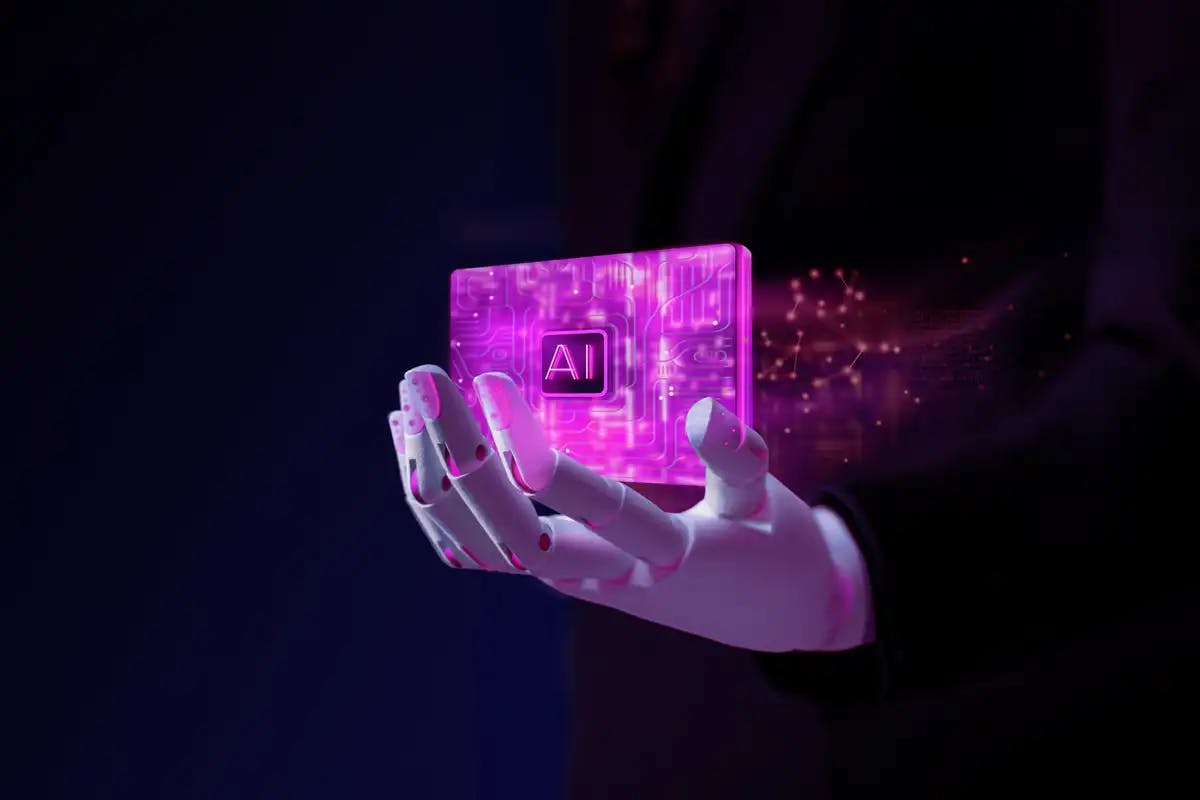


In today's big business meetings, top bosses like CEOs and CTOs are excited about how smart computer tech, called artificial intelligence (or AI for short), can help their businesses. It goes beyond just being trendy; it's about tangible advantages.
Think about it;
What if a computer could tell you what will be popular next in the market, really get what your customers want, or help you do your work faster and smarter?
But using AI isn't just about following a trend. It's about really understanding the different types of AI out there and picking the right ones that fit what your business is trying to do.
Bosses often wonder,
"Which AI tools will help solve our problems?"
or
"How do we make sure our AI is doing the right thing?"
or
"What computer languages do we need to get AI working for us?
Looking ahead, it's clear that getting to know and using AI is super important. This guide is here to help explain the big deal about AI. So, if you've ever wondered about how computers can learn things on their own (that's called Machine Learning), or how they can understand and talk like humans (that's Natural Language Processing), or even how they can see and recognize stuff (that's Computer Vision), we're here to help. Let's dive in and explore this exciting world together. By the conclusion, you'll grasp how AI can propel your business to the forefront.
Machine Learning is like teaching computers to learn from experience. Like when we learn from mistakes, computers can look at data, see patterns, and make decisions without being told precisely how. 90% of financial institutions have incorporated machine learning, with 46% employing it as a central aspect of their operations and 44% applying it in specific sectors. The remaining 10% are in the experimental phase with the technology. It's a part of Artificial Intelligence where computers improve tasks by studying examples and information. Today, with tech things changing at lightning speed, Machine Learning (ML) is making a huge splash. If you're in charge of a company, you need to see how ML can shift how you work and make money.
Put, Machine Learning is like giving a computer its brain to learn and figure things out. Instead of us sharing a computer for every tiny instruction, with ML it can look at loads of data, learn from it, and then make smart guesses or choices. This means these smart computers can work fast, be super spot-on, and handle lots of tasks simultaneously without getting tired.
Now, for businesses, especially in busy tech places like the USA, diving into ML can be a big boost. It can help businesses give their customers cooler and more personal experiences, spot what will be popular in the market, or take care of big work stuff with little human help.
Not using ML might put your company in a tough spot. Imagine this - if other companies are using ML to dig deep into data, make smarter decisions, and roll out cooler stuff, and you're still doing things the old way, they'll move ahead, and you'll lag. It's like they're driving a super-fast car while you're on a bicycle. The gap between you and your rivals will expand. This means they could attract more customers and rake in more profits.
So, if you're a big-shot in a company, like a CEO or CTO, you need more than just thinking about ML. As many companies in the USA and everywhere else hop on the ML train, it's turning from a 'good-to-have' to a 'must-have'. It would help if you jumped in to avoid falling way behind in the race.
Natural Language Processing, commonly called NLP, involves training computers to comprehend and employ human language. Imagine a computer reading, understanding, and replying to what we say or write. It's a part of Artificial Intelligence that helps machines communicate with us in our everyday language, making interactions smoother. According to Statista, the NLP market is projected to grow nearly 14 times from 2017 to 2025, rising from approximately three billion U.S. dollars in 2017 to surpassing 43 billion in 2025.
Have you ever wished that computers could understand and talk just like us? That's what Natural Language Processing, or NLP for short, is all about. Think of it this way: someone from anywhere in the world chats or speaks to an app on their phone, and the app not only gets what they're saying and talks back right away. That's the cool thing NLP can do.
In big countries like the USA, where people speak many different languages and ways of talking, NLP is super handy. It aids companies in grasping their customers' emotions. With NLP, they can have automatic chat helpers (called chatbots) that answer questions, translate stuff into different languages, and do many other helpful things. So, for businesses, NLP is like having a magic tool that makes talking to customers much easier and fun.
If businesses refrain from using NLP, they could avoid problems. Imagine if a customer is trying to talk to an app and the app doesn't understand them or it can't speak their language. That would be frustrating. Businesses could lose out on making sales and might get some not-so-happy reviews.
For big bosses, like CEOs and CTOs, who want to be the best in the business game, not using NLP is like leaving money on the table. Imagine if a business competitor's app could chat with people in many languages, help them, and make them happy. They would be winning, right?
To put it simply, NLP is more than just some tech talk. It's a real game-winner for making users happy and getting to know them better. For any business thinking of growing big, especially in places with many languages like India, NLP could be the golden ticket to getting more happy customers and growing bigger.
Computer Vision is a way for machines to see and understand pictures and videos, almost like how our eyes work. It's a part of Artificial Intelligence. Think of it as teaching computers to recognize things in photos, like faces or objects, and respond to what they see. The computer vision market is anticipated to experience a compound annual growth rate (CAGR) of 12.56% from 2023 to 2030, reaching a value of US$50.97 billion by 2030.
You have an app on your phone that can tell what things are just by looking at a picture. Or think about a computer that knows if you're happy or sad just by looking at your face. This cool stuff is called Computer Vision. It's like giving computers eyes and brains to understand what they see.
For companies, especially in significant places like the USA, Computer Vision can do lots of amazing things. For instance, retailers can design apps that allow you to virtually try on outfits without physically putting them on. If you're house-hunting, some apps let you take a virtual walk inside homes for sale. Doctors can use apps that help spot health problems, and car companies are making cars that can drive themselves safely.
If a company doesn't use Computer Vision and its rivals do, it might get left behind. Let's say a shop has an app where you can point your camera at a dress and get info about it, but another doesn't. Which app sounds cooler? Or think about safety. Many apps now let you unlock them by looking at your face. If an app only uses a password, it might seem old-fashioned and unsafe.
Companies must pay attention to Computer Vision to make their apps or products cooler and easier for folks to use. They may need to stay updated with the newest tech gadgets. So, for the big bosses at companies in the USA who want to be top-notch and reach people everywhere, Computer Vision isn't just some fancy tech thing. It's super important to make sure they're at the top of their game. Not using it might mean missing out on making things better for their customers and growing bigger.
Deep Learning is a kind of computer brainwork that teaches machines to think like humans using patterns and data. It's a special part of Machine Learning. With it, computers can learn from lots of information and make decisions, like recognizing voices or pictures, without being specifically told.
When we talk about computers being smart and thinking like humans, a big part of that is thanks to something called Deep Learning. Deep Learning is a super brain for computers. It helps computers look at lots of information, think about it differently, and make smart choices. This is why when you talk to voice helpers like Siri or get movie suggestions on Netflix, they seem so smart.
Now, think about people who run big companies, especially in places like the USA, where technology is a big deal. These bosses are always looking for new ways to make their business better and cooler. Deep Learning is like a secret weapon for them. It can help apps or websites understand what users like, guess what will be popular in the market, and even spot if someone's trying to cheat the system. This is all because Deep Learning can look at heaps of data and see patterns or details that most people or basic computer programs might miss.
What if some companies decide they don't need Deep Learning? Well, they could end up missing out. Their apps will be less cool and helpful. They may not see a new trend coming and get left behind. And, if their rivals are using Deep Learning to get ahead, they might lose customers to those smarter companies.
So, Deep Learning is like the superhero of the computer world. It's helping make all kinds of tech stuff better and smarter. For anyone running a big company, especially in the USA, using Deep Learning isn't just a good idea; it's a must-have tool to ensure they stay on top of their game in this fast-moving tech age.
Generative Models are like computer artists. They learn styles and patterns from existing data and then create new, similar stuff independently. So, they can make things like pictures, music, or other data that feel real, even though a machine, not a human, makes it. Initial models such as ChatGPT emphasized generative AI's potential to enhance creative tasks. However, Gartner predicts that by 2025, over 30% of new drugs and materials will be identified using generative AI methods, a significant increase from none today.
Generative Models are like a new magic trick in the computer world. Think of them as a tool that lets computers make new stuff after they learn from stuff they've seen before. For example, after looking at lots of paintings, they can create a brand-new painting by themselves! And it's not just about paintings. They can make new songs, videos, and even pretend data that feels real.
Now, if you're running a business, especially in tech places like the USA, this tool can be a big win. Imagine you're trying to make a new product, and you want to see how it looks without making a real one first. Generative Models can help you make a pretend version to test out. Or, if you're making a new mobile app in places like India, you can use these models to create fake data to test the app without using real user data. That's not only smart but also private and safe.
Consider a scenario where certain businesses opt not to utilize Generative Models. With this advanced tool, their processes might become active, hindering the speed of creating fresh, innovative products. This reluctance could inflate their expenses, as older methods often demand more time and resources. Moreover, in a market where competitors embrace Generative Models for efficiency and agility, the companies avoiding it could face a competitive disadvantage. They risk being perceived as outdated, potentially driving away tech-savvy customers and reducing market share.
Simply put, Generative Models are like a cool new tool in the tech world. They help computers create all sorts of new things. For the big bosses in companies, especially in places like the USA, using Generative Models is a must. It's not just about being fancy with tech; it's about staying ahead and doing smart business in a world that loves quick and new things.
Expert Systems are like computer advisors. They use stored knowledge to make decisions just like a human expert would. Think of it like a computer giving advice based on many "if this, then that" rules, helping in specific areas like medicine or finance.
Think of these as computers pretending to think like smart humans. They work on a simple 'if-this-then-that' rule. They use a lot of detailed info to give answers or solutions for specific issues.
For businesses, especially in places like the USA where tech is big, Expert Systems can make a huge difference. Think about a mobile app company in India. If they use Expert Systems, their apps can make decisions like experienced doctors or money experts. That's cool.
If a company chooses not to use Expert Systems, it's like opting to drive an old manual car instead of a modern automatic one. Consider a bank in the USA that processes loan applications. With Expert Systems, they can quickly analyze an applicant's data and decide if they qualify for a loan. Without it, they'd rely on employees to manually review each application. This manual approach might lead to errors, such as approving a risky loan or denying a deserving applicant.
This not only takes longer but might also cost the bank in terms of bad loans or lost customers. In the fast-paced American business scene, such delays and mistakes could put the bank at a competitive disadvantage.
So, for big bosses like CEOs and CTOs, ignoring Expert Systems is like not using a tried-and-true helper. In today's world where being fast and right is so important, Expert Systems are like a trusty friend, blending the knowledge of the past to help businesses succeed today.
In the quickly evolving tech world, Artificial Intelligence (AI) plays an important role. It's making changes in many job areas. Using the newest AI tools is necessary if you want to keep up. Things like Machine Learning, talking to computers (Natural Language Processing), and letting computers "see" (Computer Vision) are big steps in making tasks easier. We also see tough stuff like Deep Learning and cool things like Generative Models that show how powerful AI can be. Expert Systems are like computer experts making decisions like a person would. To do well in AI, it's essential to use the best tools and always learn about new ones. As we know more about AI, keeping up with the latest and best tools is the key to doing great things in this exciting area.




Every great partnership begins with a conversation. Whether you’re exploring possibilities or ready to scale, our team of specialists will help you navigate the journey.